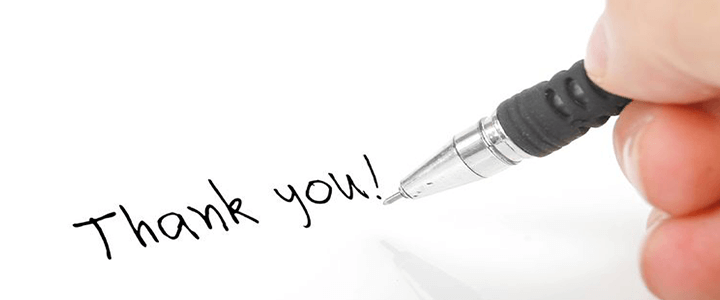You’re done with your interview, and you’re feeling good—not because you know you’re getting the job (there are a few others with whom you’re competing), but because you know you performed well, very well, from first contact to graceful exit after. Everyone was smiling, shaking hands, saying thank-you. Now, you can relax a little . . . until the next round of resume and wardrobe refinements, research, and interview prep in which you think from both sides of the desk. There are a few more moves that aren’t just courteous and the right things to do, but courteous and the right things to do that can help keep you in the mind of those making the hiring decision.
SAY THANK YOU
You expressed your thanks when you walked in the door, when you got up to leave after the interview. What else is there? The proper thank you note. A note is right. A text is beyond too little, too informal, and too familiar. A phone call is too quickly too imposing and too much (and phone calls disappear as soon as the line goes dead). An e-mail . . . well, you have already exchanged several with the hiring team, so that might make sense, but that’s just another e-mail, and we all have thousands of those in our inboxes. Imagine how many hiring managers have from candidates. And it’s still a little too informal for a proper thanks. Time to go mid-twentieth century on them and send a thank you note snail mail.
Forbes contributor Liz Ryan offers some really excellent, clear, game-changing advice in “How to Follow Up After a Great Interview.” You’re serious about the job. You simply want to put the right final touches on what’s been a grueling process. Take a few cues from Ryan.
BRAINSTORMING
First, after the interview, don’t head to the local watering hole for a few celebratory drinks with your friends. Go back to your office, sit down, and pour your mind out—write down everything you can about your experience in the interview. “Capture everything that happened and everything that was said in the interview,” Ryan writes, “your ideas, your concerns, your high points and your ‘Ahas!’ before they slip out of your memory.” This process is more brainstorming. And as Ryan explains, this effort isn’t about analysis—which is good. It’s about capturing everything you can before it slips away. You can analyze it later. Don’t be organized, don’t spell and grammar check, just write write write and hit Ctrl + S often. Then, suggests Ryan, “give yourself a few hours to relax and congratulate yourself!”
WRITING
Now, after some rest, time for analysis. Your analysis will be important for your next interview so you can continue to improve on what didn’t go so well and reinforce what you did. But the analysis is important, too, for some insightful, thoughtful, message-sending memorable thank you notes. “You must mention something you and your hiring manager discussed,” Ryan advises, “that will bring you back to his or her mind—a topic the hiring manager will not have discussed with every applicant” (my emphasis).
Then, begin writing—not on the thank you note. As with most any well written piece that you want to make a good impression, work through several drafts, edit it, proofread it to death, and then set it aside for a while so your brain can rest. Then, later, pick it back up and read it again, out-loud, slowly and deliberately. How does it sound? Is it too effusive? Don’t be effusive. Stay focused on your objective here—distinctive and memorable. Ryan’s example picks up on her advice to come back to something unique to your interaction with the hiring manager. Then, expand some on that. Hopefully, it’s job- or professional-experience-related (not how Clemson cut down Alabama in the National Championship). And, again, you’re just continuing the conversation. Ryan closes her example, “I’m excited about continuing our conversation. Thanks again for your time and have a great week.”
My handwriting is terrible, so while I’ll absolutely use what Ryan suggests—“a simple fold-over note card, either one with a design on its front or a plain front,” I will figure out how to feed it through printer and personally sign it. I might burn up a dozen or so of them, but the one I send out will look be legible and look sharp.
Do well.



